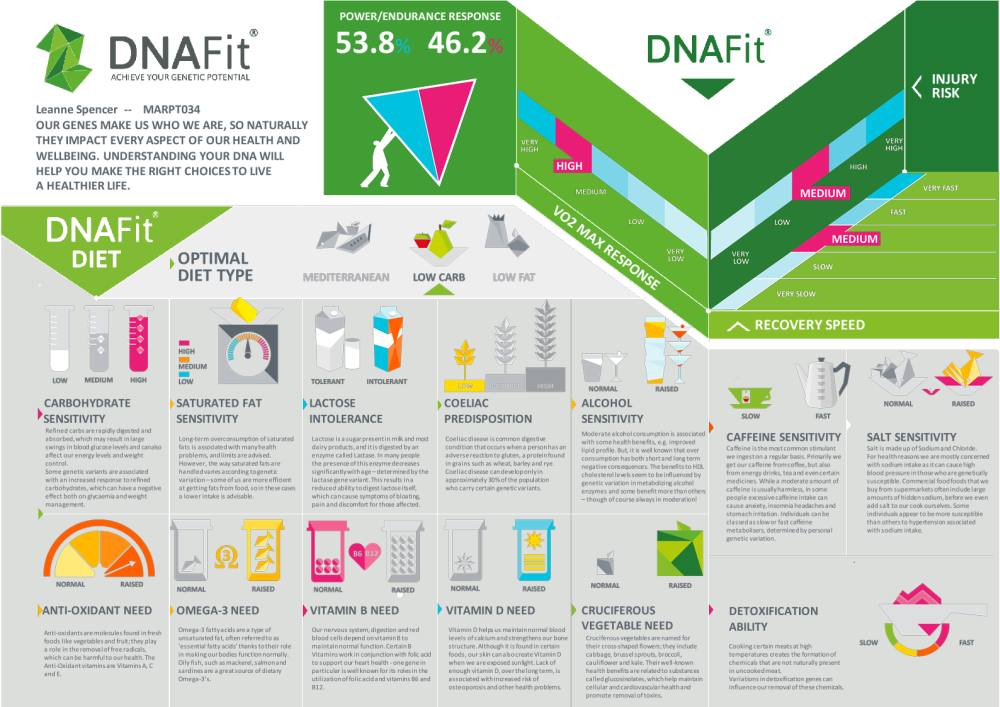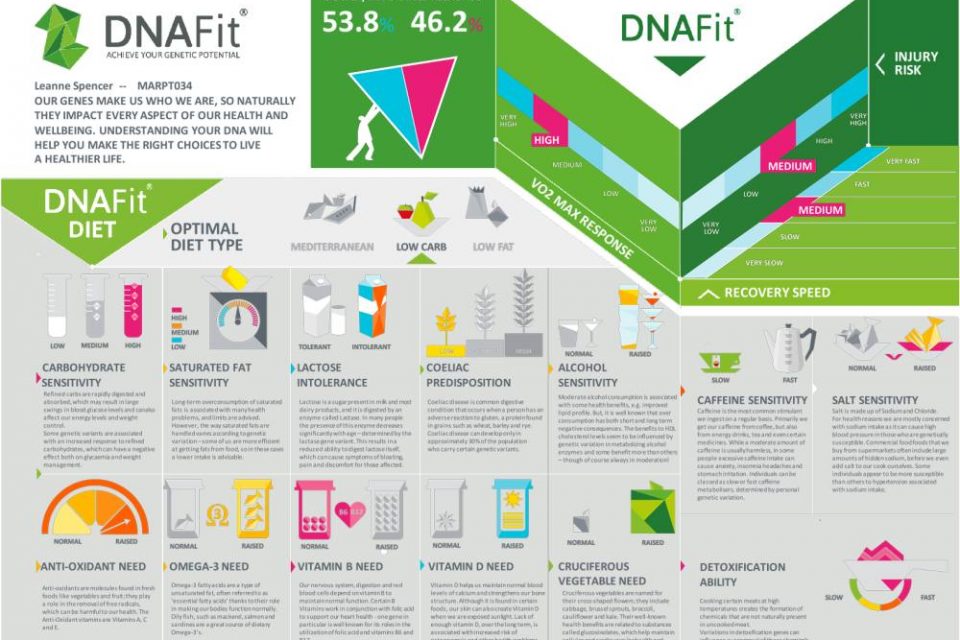
I’m taking part in my first half-Ironman in the summer. My training officially starts on April 1st, and I’m using this month to rest a little, maintain my current level of fitness and plan my 3 month training plan. My ultimate goal is always this: to get to the start line fit and with every expectation of completing the race. I’ve taken part in enough events now to know that measuring the success of an event based on how quickly you can complete it can be counter-productive, and also lead to disappointment. It can also cause unnecessary injury risks, and cause you to peak too soon. Anyone can set an ambitious finishing time target, and run a fast first half (just look at my split times in last year’s London Marathon), but the real skill in these endurance events is careful planning round training, and being open-minded about making changes and tweaks as and when you need to.
Using my DNA
This year I have access to data that I didn’t have this time last year. I’ve done a DNA test which removes all the guesswork I’ve made about what type of diet and what type of exercise work for me. The DNA test revealed my power versus endurance ratio, my soft tissue injury risk, my recovery times and my VO2 trainability, all based on analysis of my unique DNA. It also tells me what my ideal nutritional requirements are, with optimal health in mind. In short, I have a wealth of information available to me that I didn’t before. In theory, I have all the information I need to plan my training, and ensure that I get to that start line in great shape, mentally and physically.
My fitness results
I know that my power versus endurance ratio is 53.8 power v 46.2 endurance, which means genetically I’m slightly better configured for power-based activities, although really I should be a good all-rounder. What this means for my training is I will include power-based training such as interval sprints, HIIT training and speed work into my bike and running training plan, even though the half-Ironman is an endurance event. My recovery speed is medium, so I know I need to build in rest and recovery times into my plan. If I do two sessions in one day (which I do on Mondays), then I’ll take Tuesday off to recover before Wednesday’s session. I might use Tuesday to do some light stretches or some foam-rolling, but that will be it. My injury risk is also medium (this refers to soft tissue such as tendons or ligaments), so I will ensure I have a solid stretching and flexibility routine to minimise this risk.
The highlights of my diet results
There’s lots to say about what the DNA test revealed here, but the highlights from a weight management and health perspective are around carbohydrate sensitivity, lactose tolerance and my requirements for key vitamins. I am highly sensitive to carbohydrate, which means two things: firstly, I am more likely to store excess carbohydrate as subcutaneous fat, and secondly, I metabolise carbohydrates very quickly. In order to manage my blood sugar levels and weight, I should eat a relatively low carbohydrate diet. Of course, I know that I need to offset this advice with the volume of exercise I’m doing, but this is very valuable information to have. I also discovered that I am lactose-intolerant, which explains some of the digestive issues I’ve had (which have been significantly alleviated by cutting out lactose). I also know that I have an increased requirement for vitamin D3, anti-oxidants, cruciferous vegetables and omega 3’s.
What else has the DNA test told me?
The test has also told me what my sensitivity is to salt, caffeine and alcohol, and what my body’s natural detox-ability is. I now know what my requirements are for crucial B vitamins (B6 and B12) and whether I have any sensitivity to gluten or am at risk of Coeliac disease. When you look at all this information as a whole, it is basically providing you with everything you need to tailor your diet and train according to your genetic make-up. Since I’ve been using this information, I haven’t been injured, my blood sugar levels are very stable and my weight never varies. I can ignore the mass of one-size-fits-all information and advice that there is out there in both the general media and fitness press, because I now have everything I need to personalise what I do.
Other things I will consider
Nutrition and exercise are only two aspects of my training plan. I’ll also be considering sleep (8 hours a night ideally), and making sure that my room is completely dark and my smartphone is in another room. Consistently good levels of hydration are vital throughout the training period – glugging back litres of water a few days before an event will make no difference if you’re dehydrated. Staying relaxed and rested, especially in the couple of weeks leading up to the event will be crucial, and I’ll be factoring in a massage every two weeks from now on as part of that. I’ve started doing breathing exercises to help me relax, and I recommend this as a great way to de-stress and take a few minutes to clear out your mind of any chatter.
Top tips for ensuring you’re fit at the start line
- Sometimes less is more – ensure you plan for rest and recovery
- It’s ok to skip a session from time-to-time if you feel ill, tired or mentally you’re not up for it
- Listen to your body, and use DNA testing to personalise your training and nutrition plan
- Don’t be afraid to go ‘off-piste’ – by this I mean, you don’t have to 100% stick to the plan – remember what the ultimate goal is!
- Try and enjoy the training – it really helps to make the event a success, and stress can be counterproductive to your training and overall health
Leanne Spencer is a Fitness Entrepreneur, Author of the Amazon Bestselling book Rise and Shine: Recover from burnout and get back to your best and Founder of Bodyshot Performance Limited. Bodyshot specialises in bringing the science of genetics to the world of fitness. Connect with the team @BodyshotPT or Facebook or visit our website at www.bodyshotperformance.com.


